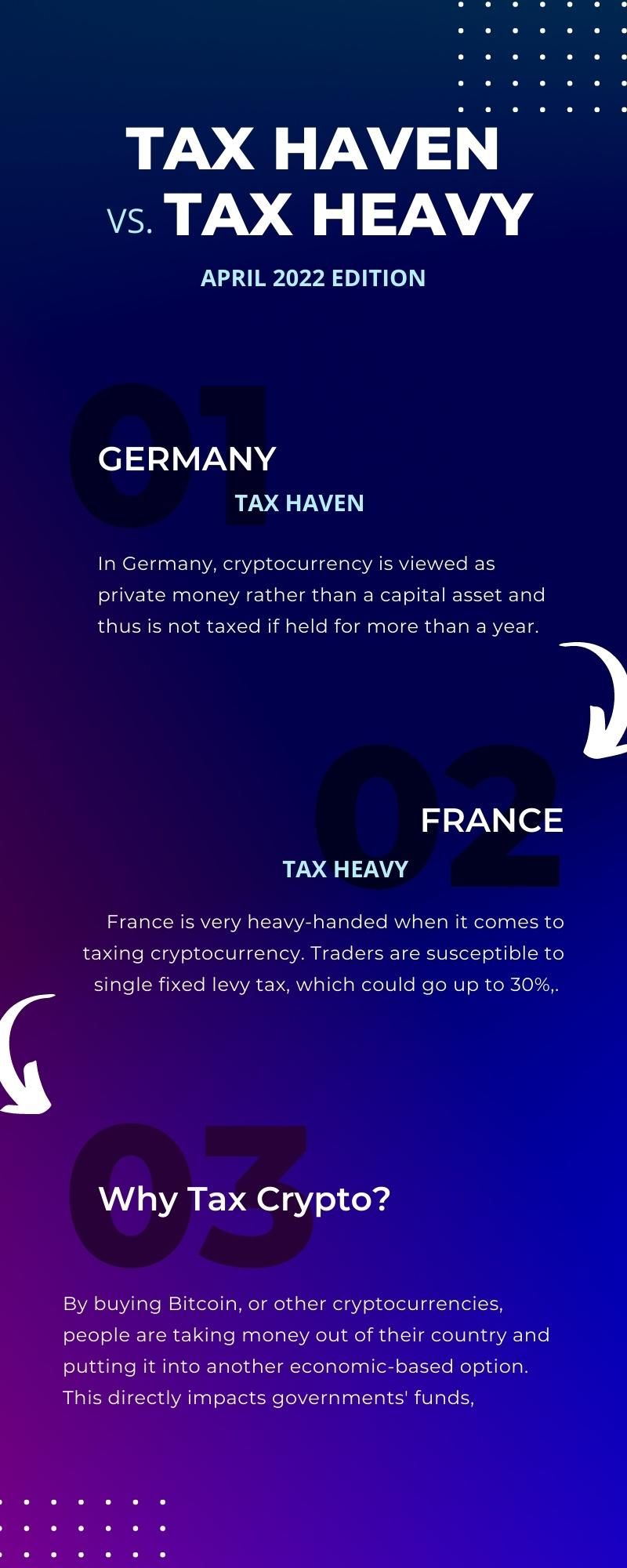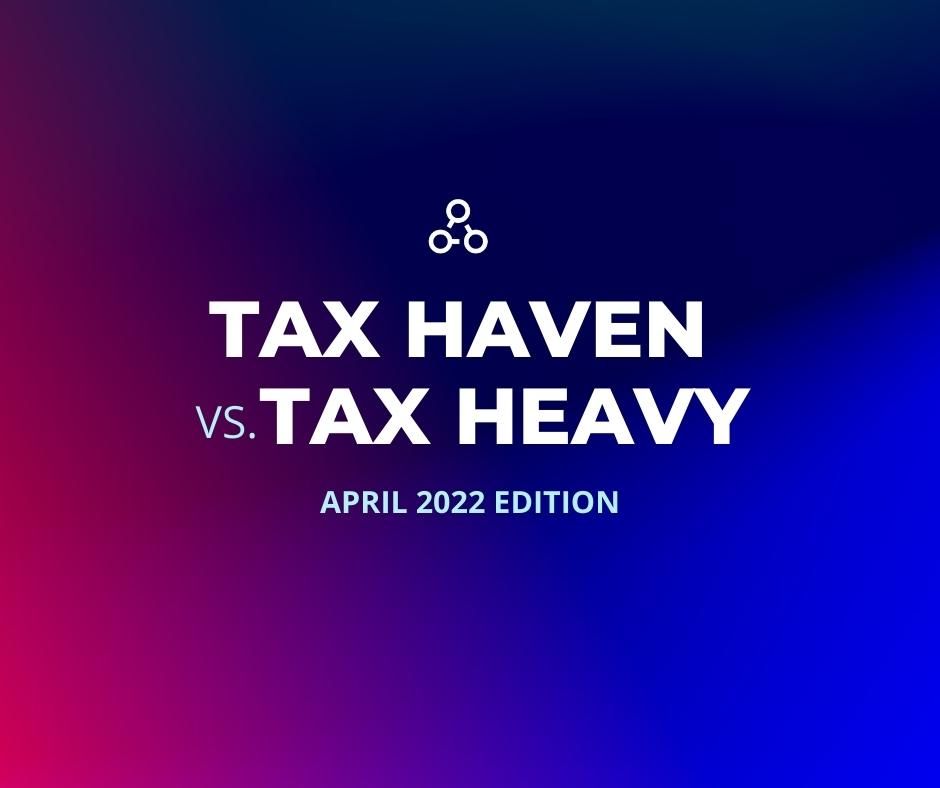Cryptocurrency is breaking out of its niche market and reaching the masses of the mainstream, spreading across the globe. With this increase in popularity and usage, we are seeing an increase in regulations and taxation. As crypto continues to evolve, so will the regulations and tax laws around them.
Countries are seeking to tax users on cryptocurrency profits as a way to bring money back into the economy. Some of these tax laws are extreme, while others lean on the side of the user, but which is which? Let’s take a look at some of the tax havens and hells of Europe.

Tax Havens
Germany
Germany is not a tax-free country when it comes to crypto, but its crypto taxes are easily avoidable. Cryptocurrency is viewed as private money rather than a capital asset and thus is not taxed if held for more than a year. If you do decide to withdraw before a year, you will not be taxed unless your profits exceed €600.
In order for staking profits to not be taxable, the asset must be held for more than 10 years. You may run into crypto income tax if you receive a salary in crypto or are mining crypto. Otherwise, Germany is pretty pro-cryptocurrency with few tax laws to take away from profits.
France
France does tax cryptocurrency, but as of recent has made the effort to figure out how to benefit both its country and cryptocurrency users. The French State Council amended its tax regime of profits generated through cryptocurrency sales, reducing it from up to 45% to 19%. The sale of crypto was reclassified from capital gains to movable property.
Portugal
Portugal is a tax-free cryptocurrency haven as of 2018. If you are a business using cryptocurrency, or a professional trader, you may be subject to taxation. All proceeds from selling and buying cryptocurrency are tax-free. It is not considered for investment or income tax as of yet.
If you are not a business or professional trader, Portugal will not implement any VAT, income, or capital gains tax. Portuguese authorities view cryptocurrency like any other currency, not just an asset. If you like sunny skies and no tax, Portugal may be the place for you.
Switzerland
The Swiss Federal Tax Administration released a 2019 working paper that confirms that the sale of crypto by individuals is tax-exempt. This means you can put money into cryptocurrencies without the worry of capital tax on the realized profits. Professional investors will be taxed.
Slovenia
If you want a tax break then Slovenia may be the place for you. The Financial Administration of Slovenia has declared that there will be no tax on cryptocurrency profits received by individuals. You may be liable to pay tax on business or professional activities.
Tax Heavy
Norway
In Norway, crypto sales will qualify as capital gains and be liable for 25% tax. Norway also considers mining crypto as an income and thus is taxable. Businesses will be liable to pay corporate income taxes on cryptocurrency incomes as well as 25% VAT on crypto sales.
United Kingdom
In the UK, you will be eligible to pay capital gains income tax on cryptocurrency sales. You could end up paying 20% or higher as well as additional rates as a taxpayer. There is a tax-free allowance exemption for capital gains tax of below £12,300.
Netherlands
The Netherlands makes cryptocurrency users pay on fictitious gains, which is relatively low, with tax coming in at around 0.54 - 1.58%. So even hodling leads to taxes, otherwise, you may also be taxed on unrealized gains. Income taxation will occur on activities such as staking, mining, and trading.
Spain
Spain takes tax evasion very seriously and demands that all citizens must disclose their profits from cryptocurrency trading. Short term trades, usually less than a year, may be taxed anywhere from 24 - 52% on profits. Long term trade profits could be taxed up to 23%.
Italy
Italy tax authorities have deemed cryptocurrencies akin to foreign currency. Income arising from exchanges relating to cryptocurrencies or from cryptocurrencies to traditional currencies will be subject to substitutive tax. You will be liable to pay a flat rate of 26% on sales.
Malta Crypto Tax
Malta is a very interesting case when it comes to crypto tax in Europe. They may be an island, but they are a part of the European Union. Most consider Malta a crypto tax haven, but they do have some harsh tax policies in place too.
Generally speaking, Malta has a very positive view of cryptocurrency. They consider it a unit of account, a medium of exchange, and a store of value. There is also no capital gains tax on long term profits, allowing you to hodl in peace.
Unfortunately for our day traders out there, you would be facing some very severe tax. Malta considers day traders in line with stock or share traders, therefore falling under the business income tax bracket. Day traders are liable to pay up to 35% in tax.
Some of the tax could be reduced, depending on your profit margin and citizenship status. This is especially harsh deeming a day trader might make roughly €800 a day, they would have to pay €280 over in tax. Then add in the losses they probably had due to volatile markets, not a good day to be a day trader.
Why Tax Crypto?
If there is one reason we have seen so much FUD spread by governments and authorities, it's due to crypto disrupting their economies. National fiat currencies are dependent on how the countries’ economy is doing, whereas a cryptocurrency’s price is valued by the project's economy, plus supply and demand. In order to buy crypto, users would have to convert their fiat USD or Euros into Bitcoin.
By buying Bitcoin, or other cryptocurrencies, people are taking money out of their country and putting it into another economic-based option. This directly impacts governments' funds, meaning they no longer have control over the value of the currency converted. Cryptocurrency succeeding directly impacts the government negatively, which is why they are trying to take back power and tax you on said success.
In Conclusion
Regulation and taxation around cryptocurrency are still very new, and most countries are still trying to figure out what blockchain is. Even one of the most well-known tax havens in the world still has some hiccups in its system. In good time governments might adopt global currencies as we have seen in El Salvador, but we may still have to wait a while longer.
As of right now, there are plenty of countries in Europe that have great crypto tax policies, and nothing is stopping you from enjoying your gains over there. We hope this piece helped you learn more about Europe's crypto tax. You can buy a variety of cryptocurrencies on Oobit, the easiest way to invest, manage and spend cryptocurrency.
Oobit Technologies Pte, 50 Raffles Place #37-00 Singapore Land Tower, Singapore (048623). is a company registered in Singapore (no:201716443G), that has been approved as Appointed Representative of Oobit Technologies OÜ, Harju maakond, Tallinn, Lasnamäe linnaosa, Väike-Paala tn 2, 11415, (no: 14852617 ). Which is authorized and regulated by the FIU (no: FVR001421 and FRK001304).
